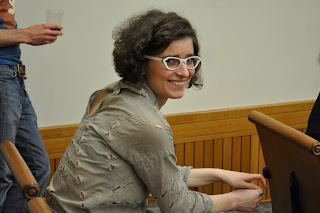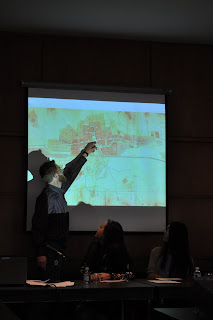We hope you all made a splash around town on your first fall day back to classes or work! We're really excited for another Slav-tastic semester here at the Birch, and to kick things off we've compiled a Slavic Summer Sampling of our favorites from this season. Enjoy!
THEATER
Cate Blanchett may be the only person officially forgiven for lambasting Chekhov as "a bugger" (see Urban Dictionary for various unrepeatable interpretations of the word)-- this summer she stunned DC audiences with a perfectly languid performance as Elena Andreevna, object of obsession for Uncle Vanya and his provincial associates. The Sydney Theatre Company brought a bizarre, Australianized version of the play to American audiences this August, performing a the tricky tragicomic balancing act that Chekhov always requires.
Check out the interview here: http://www.youtube.com/watch?v=fNFA10Fci38
BOOKS
Gary Shteyngart’s Super Sad True Love Story sketches the floundering travails of a Jewish Russian in love. An uproarious romp a la 1984, this novel charts the romance of an aging protagonist and his younger lover, who in an increasingly monitored world attempt to enjoy the few moments of privacy that love provides them.
Read the review here: http://www.nytimes.com/2010/07/27/books/27book.html
Anya Ulinich’s Petropolis
Ulinich’s darkly funny, and surprisingly touching new novel brings us into the Siberian wasteland known as Asbestos 2. Its cast of characters provide a splash of color in an otherwise gray post-industrial backdrop. Ulinich’s plucky and plump protagonist is Sasha Goldberg. Under the thumb of her anxious and aggressive mother, she begins art classes despite the fact that her skills barely exceed a firm grip of a pencil and from there, her world begins to expand from a bleak realm of limited possibilities to one that could include a brighter future in America—albeit, one that takes her (via a mail order bride agency) to the desiccated desert of Phoenix, Arizona where strip malls and saguaros replace the smoke stacks and shacks of Asbestos 2. All the while searching for her father who abandoned her, she travels across the country and her experiences are wonderfully and wittily described by Ullinich.
MOVIES
Viktor Pelevin’s Generation P, which attained cult status as a novel, has been transposed onto the silver screen, bringing the average viewer into the tumultuous, slang-riddled, sweaty landscape of Russia in the 1990s. It charts the transformations of a society and a man, Vavilen Tatarsky, as he grapples with the chaotic post-Soviet landscape. However, be warned—this movie has yet to be subtitled, so it is only recommended for those who want to brush up on their Russian (and specifically, on their русский мат).
Watching Nimród Antal’s film Kontroll is like drunkenly clamoring aboard an un-air conditioned Budapest metro car-- intoxicating and suffocating all at the same time. The film follows the efforts of rival teams of ticket controllers as they battle to prove their prowess in the shady underworld of the city’s transit authority. A highlight of this cinematic whirlwind involves a wild costume party in the metro and the reoccurring disarmingly charming presence of a train conductor’s daughter, dressed in a bear costume, aimlessly riding the metro with no ticket. Without going above ground, Antal’s film illuminates a world that is usually not given much thought once its commuters stuff their stubs in their pockets and step aboard their trains.
Watch the trailer here: http://www.imdb.com/video/screenplay/vi3902013721/











